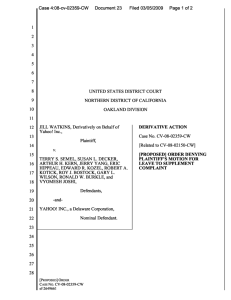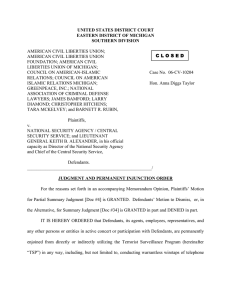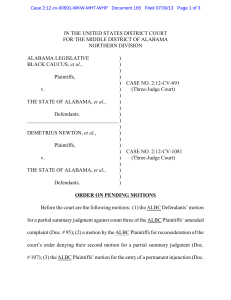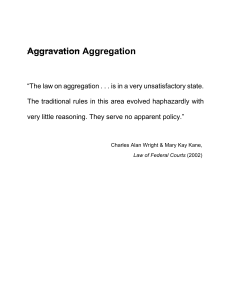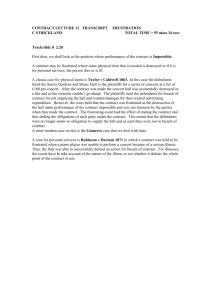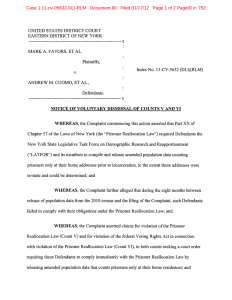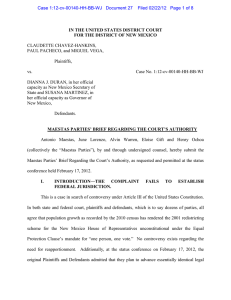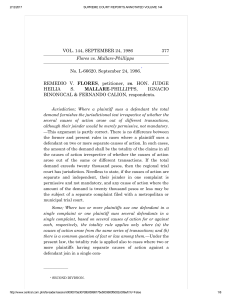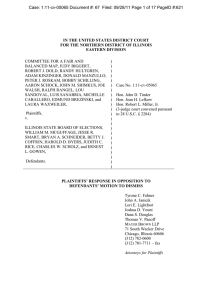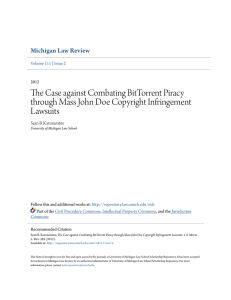IN THE UNITED STATES DISTRICT COURT AT CHARLESTON
advertisement
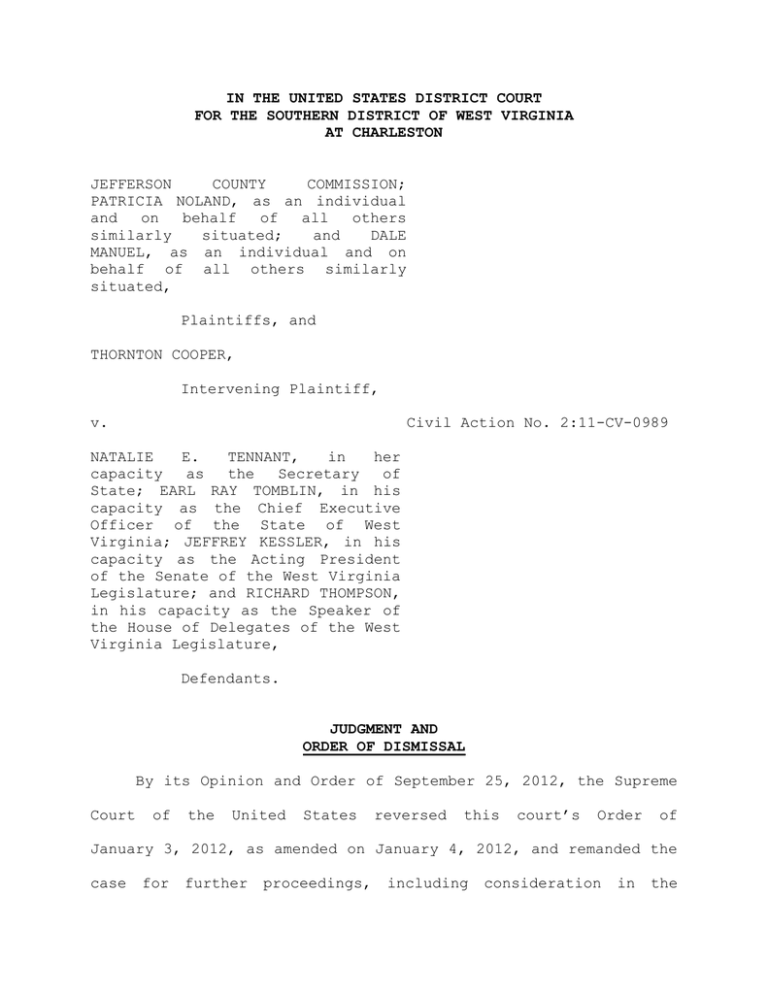
IN THE UNITED STATES DISTRICT COURT FOR THE SOUTHERN DISTRICT OF WEST VIRGINIA AT CHARLESTON JEFFERSON COUNTY COMMISSION; PATRICIA NOLAND, as an individual and on behalf of all others similarly situated; and DALE MANUEL, as an individual and on behalf of all others similarly situated, Plaintiffs, and THORNTON COOPER, Intervening Plaintiff, v. Civil Action No. 2:11-CV-0989 NATALIE E. TENNANT, in her capacity as the Secretary of State; EARL RAY TOMBLIN, in his capacity as the Chief Executive Officer of the State of West Virginia; JEFFREY KESSLER, in his capacity as the Acting President of the Senate of the West Virginia Legislature; and RICHARD THOMPSON, in his capacity as the Speaker of the House of Delegates of the West Virginia Legislature, Defendants. JUDGMENT AND ORDER OF DISMISSAL By its Opinion and Order of September 25, 2012, the Supreme Court of the United States reversed this court’s Order of January 3, 2012, as amended on January 4, 2012, and remanded the case for further proceedings, including consideration in the first instance of Counts Two and Three of the plaintiffs’ Complaint filed November 4, 2011, which assert pendent claims under, respectively, the numerical equivalence and compactness requirements of Article I, section 4 of the Constitution of West Virginia. See Tennant v. Jefferson Cnty. Comm’n, 133 S. Ct. 3 (2012) (per curiam). A certified copy of the Supreme Court’s judgment was filed in this court on October 31, 2012. The Supreme Court’s judgment is dispositive of Count One of the plaintiffs’ Complaint, which asserts a numerical equivalence claim under Article I, § 2 of, and the Equal Protection Clause of the Fourteenth Amendment to, the Constitution of the United States. same The Court’s judgment is likewise dispositive of the claim comprising part of Count One of plaintiff’s Complaint filed December 3, 2011. the intervening Judgment on both claims is therefore ENTERED on behalf of the defendants. Subject matter jurisdiction of the claims so disposed was premised on the existence of a federal question, see 28 U.S.C. § 1331, and on the alleged deprivation under state law “of any right, privilege or immunity secured by the Constitution of the United States,” 28 U.S.C. § 1343(a)(3). This court’s authority to adjudicate the pendent claims asserted by the plaintiffs and the intervening plaintiff, each of which arises under state law, is predicated on supplemental federal jurisdiction, which pertains to “any civil action of which the district courts have 2 original jurisdiction” with respect to “all other claims that are so related to claims in the action within such original jurisdiction that controversy.” they form part of the same case or 28 U.S.C. § 1367(a). According to applicable principles of law, “trial courts enjoy wide latitude in determining whether or not to retain jurisdiction over state claims when all federal claims have been extinguished.” Shanaghan v. Cahill, 58 F.3d 106, 110 (4th Cir. 1995). In exercising entitled to evaluate convenience and n.11 (4th any fairness judicial economy.” 644 the Cir. discretion of to so “[s]everal the parties afforded, factors, plus we are including concerns for Crosby v. City of Gastonia, 635 F.3d 634, 2011) (citing Shanaghan). Section 1367 itself specifies additional factors that may persuade a district court claim, to forgo including supplemental where issue of State law.” “the jurisdiction claim raises over a a novel particular or complex 28 U.S.C. § 1367(c)(1). On remand, the defendants have urged our attention to the factors set forth in 28 U.S.C. § 1367(c), suggesting that we “should dismiss the remaining claims to allow them to proceed in State Court.” Defendants’ December 3, 2012 Response to Order on Remand at 3. We construe the defendants’ suggestion as a motion to dismiss, which, upon considering the factors discussed in 3 Shanaghan and Crosby, and in particular the statutory factor above identified, we believe is well-taken. The pendent claims in this litigation indeed raise novel and complex issues of West Virginia law that the courts of the State should be given first opportunity to resolve. We therefore GRANT the defendants’ motion and DISMISS Counts Two and Three of the plaintiffs’ Complaint, together with the remainder of Count One of the intervening plaintiff’s Complaint, without prejudice to refiling in the appropriate state court. It is so ORDERED. DATED: January 25, 2013. For the Court: 4
